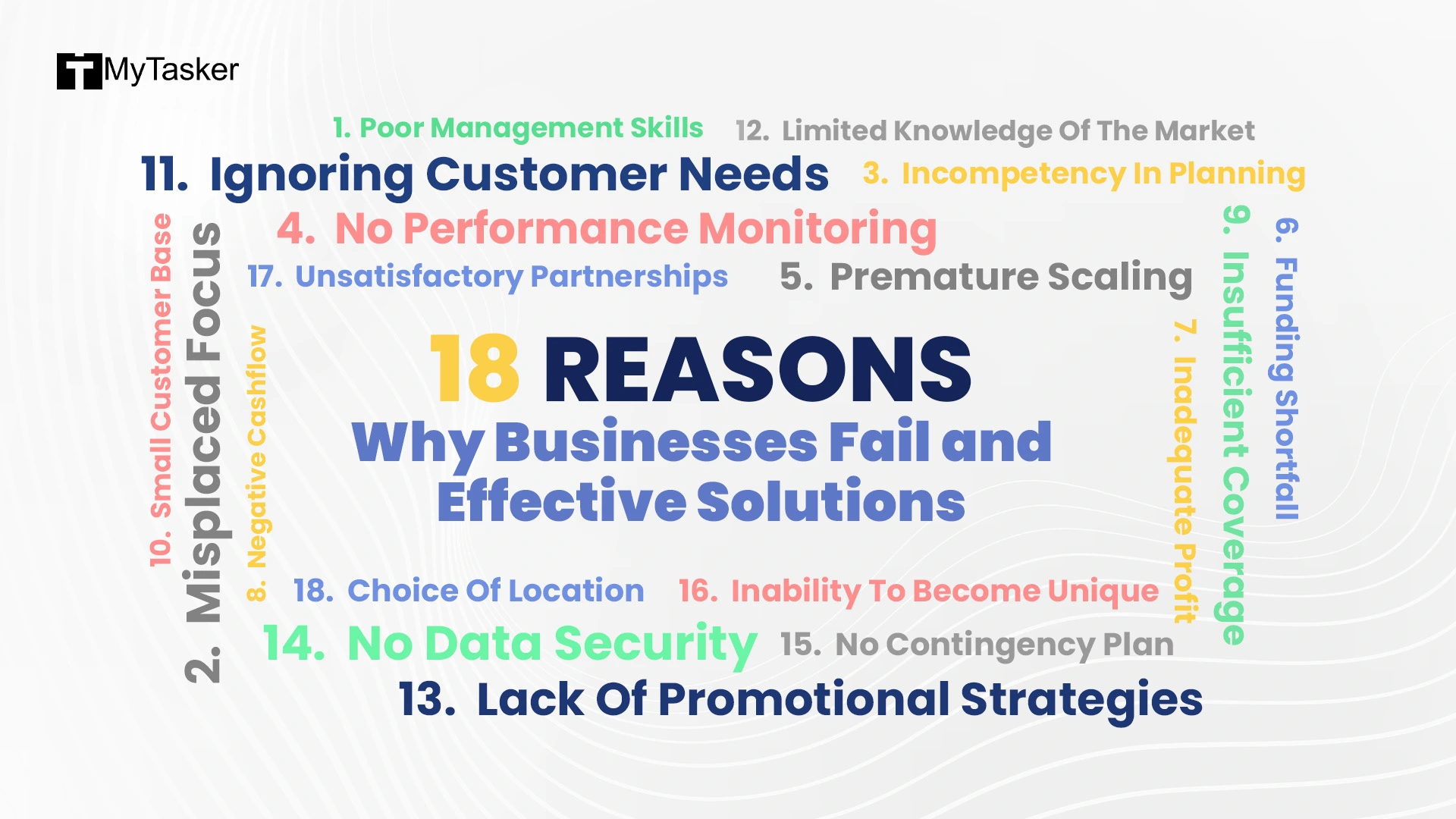Having a ride on the entrepreneurial roller coaster can be a tricky thing. While thriving on profit-making opportunities, business owners often fail to cope with new challenges, such as spiking operating expenses, inventory management, and attracting customers without a dedicated management team. As a result, they find themselves at sixes and sevens and this is why businesses fail woefully.
And in the worst scenarios, they can’t even figure out what actually went wrong!
Sounds crazy, right?
Of course, running a business is no easy task.
But don’t worry folks!
Today, you’re going to know the main reasons why most businesses fail.
Wondering how this would help you?
By identifying the main reasons for which most businesses fail, including the lack of a solid business idea, it would be easier to avoid them proactively. Proper planning and a clear business plan that includes understanding your unique value proposition and market differentiation are crucial. And for your convenience, effective solutions to those complications are also lined up that no one is going to tell you before you actually get into dire straits.
So:
What are the major causes of business failure?

2024 has witnessed high failure rates for startups, indicative of the tricky prospect for businesses which are yet to make a mark. New businesses face numerous challenges in their initial stages, and understanding these challenges is crucial to avoid failure. Small business owners must also mitigate company-specific risks while developing a competitive product or service to navigate these challenges and achieve success.
It’s been observed that nearly 90% of startups taste failure, while 10% wrap up within their initial year.
By fifth year, the failure rate jumps to 50% and by tenth year it scales much higher.
Industry-driven data reflects sky-scraping risks:
-
Blockchain and cryptocurrency startups confront a 95% failure rate
-
For tech startups, there is less than 50% scope of remaining active
Significant causes for failure involve:
Entrepreneurs must comprehend these statistics to strategize well. Effectively refining their strategies ensures success in a dynamic market.
Planning and Preparation
Lack of Clear Goals and Objectives
A clear plan is the cornerstone of business success. Without well-defined goals and objectives, businesses often find themselves adrift, struggling to stay focused and motivated. This lack of direction can lead to poor decision-making and ultimately, business failure.
To avoid this pitfall, it’s essential to create a business plan that includes specific, measurable, achievable, relevant, and time-bound (SMART) goals. These goals should align with your company’s overall vision and mission, providing a roadmap for success.
Effective planning and preparation can help businesses sidestep common issues such as poor cash flow management and ineffective marketing strategies. Developing a minimum viable budget is also crucial, as it encourages frugal spending and helps maintain cash flow, particularly during challenging times. By setting clear goals and objectives, you can make informed decisions that drive growth and revenue, ensuring your business stays on the path to success.
Why do some small businesses fail and some succeed?
Success and failure in businesses depend on several key factors. Companies that taste failure often have the following factors -
-
Lack a strong and refined strategy.
-
Confront financial problems.
-
Poor management practices that lead to weak leadership, financial losses, and decreased employee morale.
-
Depend on unproductive marketing.
-
Too much dependence on a few key clients.
-
Disobeying regulations that intensify their difficulties.
-
Failure to learn from the experiences of other business owners.
On the contrary, successful businesses flourish by having -
-
Sound and efficient plans
-
Financial security
-
Target-oriented marketing
-
Effective leadership
-
A varied customer base
-
Adjustable market shifts
-
Respect for legal standards
How to rescue business failure?
To understand the root causes of a failing business and bring it back on track, a strategic outlook is the call of the hour.
-
Initiate by implementing an overall survey to detect the main reasons for the problems.
-
After that, draft a clear, refined plan with applicable goals.
-
Acquire financial stability for enhancing working capital. The price must be perfect, collections need to be improved, and expenses need to be checked. This will ensure cash flow management and help gain stability.
-
To boost customer engagement, upgrading marketing efforts is vital.
-
Management reinforcement should be done in the form of training employees or hiring new prospects.
-
Focus on cutting down risks and create room for recovery.
-
Expand the customer base.
-
Ensure legal adherence.
What are the solutions to the causes of business failure?
To achieve long-term success, entrepreneurs should focus on several vital areas:
-
Creating a firm business plan.
-
Obtaining adequate financing, and cash flow management for acquiring solidity.
-
Possessing sound knowledge about the market, customers, and existing competitors.
-
Developing a strong appealing aspect and marketing strategy.
-
Building a team of skilled individuals with strong leadership qualities.
-
Getting adaptable to market shifts.
-
Possessing capacity to expand both the customer base and offerings to boost opportunities for growth.
-
Strictly adhering to rules and regulations.
-
Embracing recent innovations in small business management to optimize operations and boost customer interaction.
Evade the banana skins on your way! Embrace the best implementation!
Strive for everlasting success in this competitive business world.
How to solve business problems?
To decode business problems constructively, a methodical approach is pivotal. To address the high failure rates and common pitfalls that small businesses face, it is crucial to focus on challenges such as cash flow management, thorough planning, and effective marketing strategies.
-
First, clear identification of the problem needs to be done by exploring beyond symptoms appearing on the surface level.
-
For obtaining deeper insights and divergent views for innovative solutions, collect and probe significant data.
-
Conceptualize available options, assess likely substitutes that are price-based, time-bound, and resource-oriented. Apply the best solution with an extensive action plan.
-
Keep regular track of your progress, make necessary adjustments, and keep them documented for later development.
-
Apply effective techniques like root cause research and SWOT analysis to comprehend deeper issues.
-
Develop dynamic problem-solving ability that increases long-lasting solidarity.
How can a business be successful?
-
To accomplish success in business, following certain principles and implementing key strategies are crucial.
-
Develop a coherent small business strategy with actionable goals and KPIs. Emphasize innovations in small business management to achieve success.
-
Focus on upgrading customer experience by realizing their needs and customizing interactions.
-
Set up a strong and skilled team and maintain clear communication.
-
Adapt quickly to market changes and handle finances effectively. It ensures strong cash flow and manages expenses.
-
Evolve through continuous learning and creativity to stay ahead in the race.
-
Through strategic marketing, you can engage customers, and track daily performance to make data-based decisions.
Master these strategies to build a strong foundation in this highly competitive world!
Effective Branding and Positioning
-
In today's crowded market, a strong brand identity is crucial for standing out and achieving business success. Effective branding and positioning can help your business carve out a unique space, attracting and retaining customers.
-
A well-crafted brand strategy should include a unique value proposition (UVP), a clear brand message, and a consistent visual identity. Conducting thorough market research is vital to understand your target audience and develop a brand positioning strategy that resonates with them.
-
Effective branding and positioning can build customer loyalty, increase brand awareness, and drive business growth. By creating a strong brand identity, you can differentiate your business from competitors and establish a lasting presence in the market.
Financial Mismanagement
-
Poor financial management is a common reason why businesses fail. Effective financial planning is crucial for ensuring business success and sustainability. Developing a comprehensive financial plan that includes budgeting, forecasting, and cash flow management is essential.
-
A well-managed cash flow can help businesses avoid financial difficulties, such as cash flow problems and poor cash flow management. Effective financial management enables businesses to make informed decisions, reduce financial risk, and drive growth.
-
By prioritizing financial management, businesses can ensure long-term sustainability and success, avoiding the pitfalls that lead to business failure.
Cash Flow Problems
Cash flow problems are a common reason why small businesses fail. According to the U.S. Bureau of Labor Statistics, nearly half of all startups fail within the first five years, and cash flow issues are a major contributor to this statistic. Cash flow problems can arise from a lack of funding, poor budgeting, or inventory management issues, among other things. To mitigate cash flow risks, small business owners can take several steps, including:
-
Avoiding big expenses in the first year of business: It’s crucial to keep expenditures low initially to build a financial cushion.
-
Implementing a lean operating budget: A lean budget helps in managing expenses effectively and ensures that funds are allocated to essential areas.
-
Tracking inventory and building cash reserves: Regular inventory checks and maintaining cash reserves can prevent unexpected financial shortfalls.
-
Ensuring accounting is running smoothly: Accurate and timely accounting practices are vital for tracking cash flow and identifying potential issues early.
-
Working with a certified public accountant: A CPA can provide expert advice on managing accounts receivable and payable systems efficiently.
By taking these steps, small business owners can help prevent cash flow problems and ensure the long-term success of their business.
Leadership and Vision
-
Strong leadership and a clear vision are essential for business success. A lack of effective leadership can lead to business failure, as it results in a lack of direction and motivation within the team.
-
A successful business owner should have a clear vision for their company and be able to communicate it effectively to their team. Effective leadership involves setting clear goals and objectives, providing guidance and support, and empowering employees to make decisions.
-
A strong leader should be able to adapt to changing market conditions, innovate, and stay ahead of the competition. By providing effective leadership and vision, businesses can drive growth, increase customer satisfaction, and achieve long-term success.
Business Owner Mistakes
As a business owner, it’s easy to make mistakes that can have serious consequences for your business. One of the most common mistakes is poor management. This can lead to mismanagement of finances, hiring, or marketing, as well as a lack of delegation of key roles. To avoid these mistakes, business owners should:
-
Delegate key roles effectively: Even if it’s not possible to hire a full senior leadership team, consider bringing in a fractional CFO, hiring a mid-level manager, or outsourcing key tasks to a partner.
-
Develop a clear business plan and stick to it: A well-defined business plan provides direction and helps in making informed decisions.
-
Stay organized and focused on the company’s goals and objectives: Organization and focus are essential for maintaining progress and achieving business success.
By avoiding these common mistakes, business owners can help ensure the success of their business.
How to succeed in a startup?
To flourish in a startup, entrepreneurs should embrace several effective strategies:
-
Comprehend and resonate with customer needs through response and flexibility.
-
Establish an in-depth vision to guide the team and prolong your ability to focus.
-
Adopt innovation by implementing new technologies and remain open to change.
-
Conduct in-depth market research to announce your unique appeal and marketing strategies.
-
Build a strong team with skilled individuals and develop a firm go-to-market strategy.
-
Take wise financial steps related to budgeting and cash flow monitoring.
-
Apply key performance indicators (KPIs) to measure progress.
-
Establish a learning curve and nurture adaptability skills.
-
Use technology to improve efficiency and customer engagement.
To flourish in a startup, it is crucial to understand why small businesses fail. Statistics show that many small businesses fail within the first few years due to poor cash flow management, lack of adaptability, and inadequate planning. Avoiding these common pitfalls is essential for long-term success.
Mastering these strategies can fuel a startup for growth and never-ending success!
How important is customer satisfaction in business success?
Customers are the cynosure of any business. Maintaining their satisfaction is crucial for long-term business growth. Let's see what it brings to the table:
-
Customers feeling well-pleased is pivotal in repeating business.
-
They offer positive feedback and increase brand loyalty.
-
High satisfaction of customers elevates a company's reputation and provides a competitive edge over other rivals in business.
-
Valuable insights from satisfied customers also enhance product refinement and upgrading services.
Opt for a top-grade all-round performance!
What role does hiring the right people play in business success?
Employing the right people is crucial for any business to taste success. They are the pillars of strength for your business.
-
Skilled, inspired employees upgrade customer experiences.
-
They offer effective solutions to problems.
-
They hold company values in high regard.
-
A strong, combined workforce ensures customer satisfaction and refined innovation.
Marketing and Customer Issues
Marketing and customer issues are a major challenge for small businesses. One of the most common issues is ineffective marketing strategies. This can lead to a lack of visibility, poor branding, and a failure to attract and retain customers. To avoid these issues, small business owners should:
-
Develop a clear marketing plan that aligns with the company’s goals and objectives: A strategic marketing plan ensures that efforts are focused and effective.
-
Use a variety of marketing channels: Including social media, email marketing, and content marketing can help reach a broader audience.
-
Focus on building strong relationships with customers: Providing excellent customer service and engaging with customers can build loyalty and trust.
-
Continuously monitor and evaluate the effectiveness of marketing strategies: Regular assessments and adjustments ensure that marketing efforts remain relevant and impactful.
By taking these steps, small business owners can help ensure the success of their marketing efforts and build a loyal customer base.
Operational Challenges
Operational challenges are a major obstacle for small businesses. One of the most common challenges is failure to innovate and adapt. This can lead to stagnation, poor customer service, and a failure to stay competitive. To avoid these challenges, small business owners should:
-
Stay up-to-date with the latest industry trends and technologies: Keeping abreast of new developments can provide a competitive edge.
-
Continuously monitor and evaluate the effectiveness of business operations: Regular reviews and adjustments can improve efficiency and performance.
-
Encourage innovation and creativity within the organization: Fostering a culture of innovation can lead to new ideas and improvements.
-
Develop a clear plan for scaling and growth: A growth plan ensures that the business is prepared for expansion and can handle increased demand.
By taking these steps, small business owners can help ensure the long-term success of their business.















